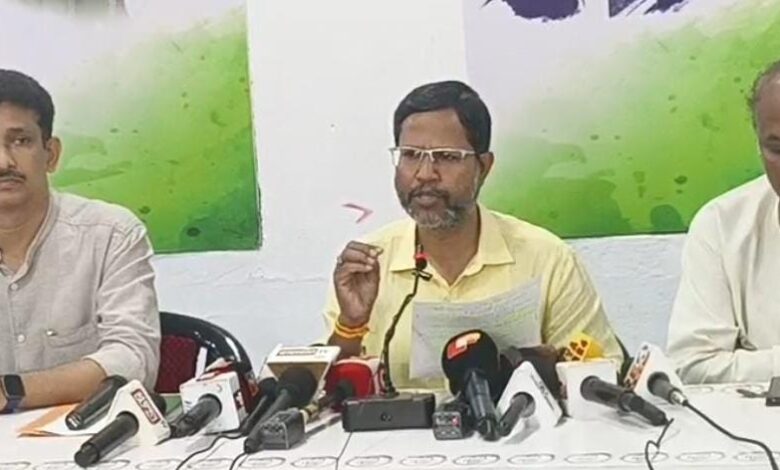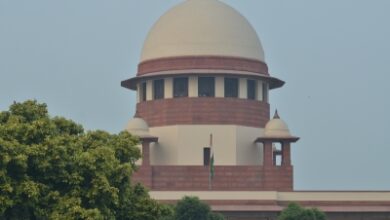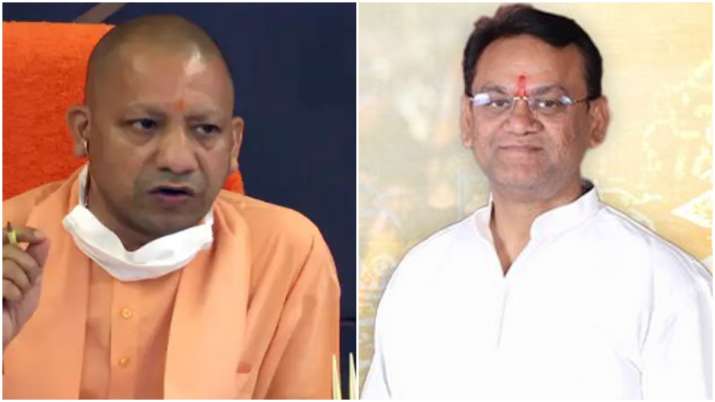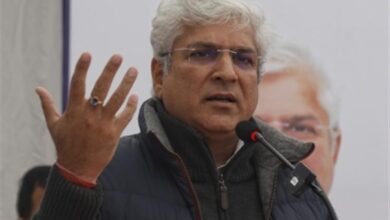
Bhubaneswar, Sept 22 : The Odisha Pradesh Congress party has sharply criticized Prime Minister Narendra Modi’s recent call to observe “Savings Week” by changing GST slabs starting from the first day of the Navratri festive season. In a press conference held today at the Pradesh Congress Office, party spokesperson Prashant Satapathy labeled this move as “GST Jumla Part-2” and ridiculed the government’s attempt to control unchecked market prices through minor adjustments in tax slabs.
Satapathy claimed that India’s economy has been severely damaged following two major decisions by the Modi government: demonetization in 2016 and the flawed implementation of GST in 2017. He pointed out that nearly 63 lakh small and medium enterprises have shut down since then. He further cited stark wealth disparities, noting that while just 1% of the population owns 40% of the country’s wealth, the top 21 richest individuals hold more assets than 80 crore people combined. In contrast, the bottom 50% of the population possesses only 3% of the wealth.
Congress highlighted that when it left office in 2014, there were 17 crore beneficiaries receiving 5kg of free rice. That number has now surged to 82 crore, indicating that 6.5 crore people have slipped into poverty each year over the past decade. Additionally, 55% of Indian farmers are burdened by loans. In 2021, the average farm loan burden was ₹74,121, which has now increased to ₹91,231 in 2024. In Odisha alone, 75% of farmers are in debt, with loans ranging from ₹60,000 to ₹91,000.
India’s national debt has ballooned from ₹54 lakh crore to ₹200 lakh crore, and unemployment among the youth has soared 48% for those aged 15–19 and 46% for the 20–24 age group. Congress also pointed out that no new government jobs are being created; rather, only vacant posts are being filled. The country’s GDP growth rate, which was 5% in 1980, 6% in 1990, and 8% between 2004–2014, has now dropped to 5.8%.
The Congress blames Modi’s demonetization and GST policies for much of this economic distress. Contrary to government claims, changes in GST tax slabs do not control market prices. GST is charged on the base price of goods, and as base prices have steadily increased over the past 7–8 years, tax collections have also risen — hurting poor and middle-class consumers. The Congress termed the Modi government’s move from 8 years of “GST loot” to now promoting a “savings celebration” as deeply ironic.
Between 2017 and 2024, the Centre has collected over ₹55.44 lakh crore in net GST revenue. Yet, instead of passing any real benefit to the common people, the government is offering marginal relief now. The Congress argues that people will only feel actual savings if the base prices of essential goods are frozen for at least the next three years. Otherwise, any savings from reduced GST rates will be nullified by rising MRP and hidden pricing tactics.
The Congress has long been demanding revisions to GST rates — particularly for medicines, agricultural tools, and essential daily-use items, which previously fell under 0–5% tax slabs before GST but were later increased to 12%, 18%, and even 28%. The Modi government, according to Congress, only adjusted GST slabs during elections in states like Gujarat, Tripura, and Karnataka, never as a consistent national policy.
Moreover, the contribution of wealthy individuals to GST revenue is only 3%, while the middle class and poor contribute 64%. High petrol and diesel prices have driven up transportation costs, causing inflation across sectors. Many companies also exploit MRP loopholes or reduce product weights without changing prices — further eroding consumer savings.
While some organized sectors may benefit from GST slab changes, 94% of India’s unorganized sector suffers losses. In 2022, the government raised GST on 131 items to 28%, which led to unnecessary price hikes. In the past five years alone, GST frauds have crossed ₹7 lakh crore.
Congress also slammed a recent notification (No. 19/2024 dated 30 September 2024) where the government stated that no legal action will be taken against companies that do not pass on tax benefits to customers. The party called this decision a betrayal and mockery of common consumers.
Furthermore, companies have begun reducing product weights instead of prices, essentially cheating customers. Congress urged the government to regulate the cost of raw materials, packaging, transportation, machinery, and electricity without which mere GST slab changes would have no impact on inflation.
The party concluded that without structural economic reforms, any savings-related campaign by the Modi government will remain just another “jumla” (gimmick). Senior Congress leaders Manoranjan Das and Dr. Debashish Bhuyan were present at the press conference.






